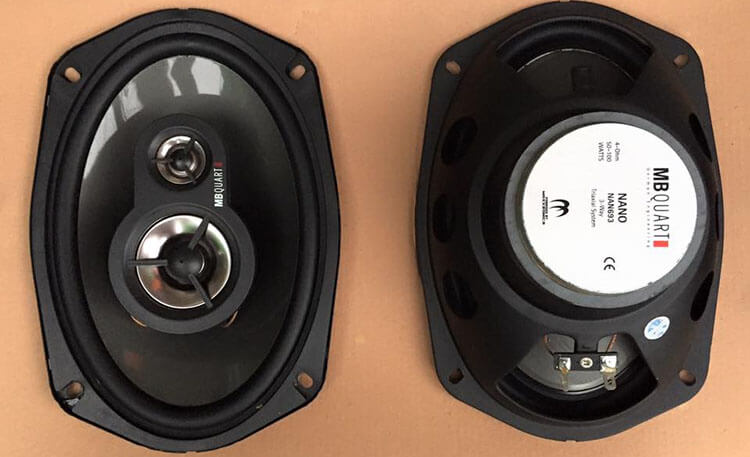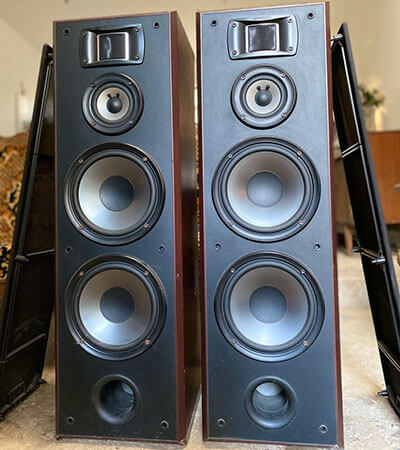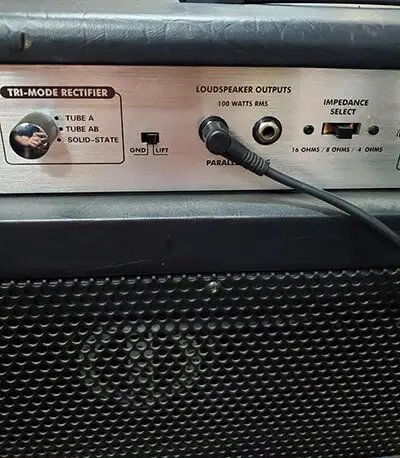Based on all the speakers I have dealt with my fault. I have come to realize you will need to know quite a lot about the specifics of speakers when you seek to mix up different parts, cables, or components.
Just to get that musical clarity you might get yourself into trouble even, and that could happen if you mix your speakers at different ohms without having full knowledge of things.
You might be permanently ruining your speakers or overheating your receivers or amplifiers if you don’t know what you are doing. A few of my technophile and audiophile buddies have done that.
But, worry not, as I am here to guide you on this issue.
Can you mix speakers with different ohms?

In short, it actually comes down to your AV receiver. You need to know if your AV receiver can handle different Ohms to provide your desired sound. You definitely can mix speakers with different ohms if the difference in the ohms between the load and the amp is little or if the impedance of the Amplifier is less than the impedance of the speakers.
And, that is because it lowers the impedance, the more easily it will able to pass electrical current and consumer more power so naturally, a 4 Ohms Receivers or Amplifiers which are those expensive Amplifiers are capable of carrying higher loads.
If the difference is less, like 4 Ohms and 6 Ohms or 6 and 8 then you should be fine with the mismatch even if the load is higher than the receiver’s Ohm.
But, it is wiser to not get a receiver that has higher Ohms than the speakers as the transformers are not designed and you’ll most likely decline the receiver’s life span by putting too much pressure on it.
As I have mentioned, you need to know about ratings. Based on what I have researched, the Yamaha AV receivers are capable of driving 8 Ohms as well as 6 Ohms, so make sure you know what you are purchasing or using.
What if the disparity in Ohms is higher?

It is quite evident if the difference in Ohms is far apart then it won’t provide any form of clear sound as the dynamic range isn’t simply there because of the difference.
So, if you have an impedance of 4 Ohms on your amplifier and you want to drive a load o 16 Ohms then you will be able to get clear sound but up to a certain volume. When you start to turn up the volume, you will notice a lot of distortions and your audio will start to break.
The sacrifice when you want to mismatch with a big difference in Amp impedance and load of the speakers is the quality once you increase the volume.
Can I run a 16 Ohms amp on an 8 Ohms load?

You will be able to play but your transformers won’t be capable enough to deliver clear audio because 16 Ohms will only be able to pass clear electrical current if the load is higher because of its power consumption otherwise you will overheat the transformer and at one point your receiver or your amplifier will shut down due to overheating.
The transformer’s wattage capacity is normally way higher than it withstands. The only way you will get good get sound is if the difference in Ohms is close even after having the Ohms of speakers more than the Amps.
Can you mix 4 Ohm and 2 Ohm speakers?
Your amp has a certain resistance filter from what I have discussed above. So, if you have a set of speakers that is 4 Ohms, then it will be able to deal with speakers that are Ohms less than its load. The load will likely either completely ruin your amp along with the speakers, or the quality of the sound will deteriorate as you raise the volume since the load is making the capacitor overheat, or one speaker will sound louder than the other.
If you manage to do the calculations, then you will see that 2 Ohms parallel with 4 Ohms leads to less than 2 Ohms. It is, I believe, around 1.3 Ohms.
But, if you own a 2 Ohm amp, then you will be able to mix and match up to 16 Ohms. Even after that, I wouldn’t recommend mixing 4 Ohms with 2 Ohms because the overload may be demanding more from 4 Ohms speakers may result in ruining your whole sound system.
How to match speakers and amplifiers in accordance with their impedances:
| AV Receiver | Rated Wattage | Rated Ohms | Compatible Speakers |
| Marantz SR7015 | 125 Watts | 8 Ohms | Polk Audio T15 (6-8 Ohms) |
| YAMAHA RX-A2A AVENTAGE 7.2 | 100 Watts | 8 Ohms | Klipsch Reference R-26FA |
| Sony STRDH590 | 145 Watts | 6 Ohms | Edifier R1280T |
| Denon AVR-X8500H | 190 Watts | 6 Ohms | Klipsch R-41M |
Now, if you do your own digging you can obviously get a lot more speakers in accordance with your receiver and vice versa. Through this table, I am showing the types of products you should buy or know the features based on their compatibility.
I don’t want you to think that for these specific Receivers, you must get the speakers I have suggested or your components will explode. This is just to make your life a bit easier.
I also would like to mention an all-rounder which is and that is compatible with speakers at different Ohms.
| AV Receiver | Rated | Rated Ohms | Compatible Speakers |
| Pyle 5.2 AV Reciever | Up to 1000 Watts | 4 Ohms | SVS Prime Pinnacle (And, it is actually compatible with most speakers out there.) |
Frequently Asked Questions
Are impedance and resistance similar things?
Yes, they are somewhat similar because through both of those things you get to know how the electrical current is flowing and how much power the components can draw. When the circuit uses AC current then you will see impedance is getting talked about and when it is about DC current, you will be Resistance.
The core difference between the two is that when it comes to changing the waveforms of voltage and currents, it is doable with Impedance but not with resistance.
What does rated impedance exactly mean on an amplifier?
The rated impedance means the minimum Ohms the Amplifier has. And, that is because the lower the impedance, easily it will be able to flow electricity and will be able to generate the most power.
So, an Amplifier or an AV receiver that has a lower rated impedance amount, know that it will be compatible with most speakers out there.
Do my Ohms need to match or do I lower the amp/speakers always?
No, it is not an absolute necessity to have the Ohms of the receivers matching with your speakers. It is okay if it matches but the target should be to have the impedance of the speakers higher than the impedance of the receivers or the amplifiers.
Or, else as I have mentioned above your receivers will overheat and produce distorted sound due to high wattage consumption.
Wrap Up!
Thus, I hope you have found clarity in understanding that you need to be very clear about a couple of things when you want to mismatch your speakers with different Ohms. You could be owning a pair of speakers that are 6 Ohms or 8 Ohms but to play those speakers without worrying about anything at all, then you need to get an amp or a receiver that is either 6 Ohms or below that.
The impedance is clearly everything and you need to be precise about it. I have tried to be as insightful about this issue as possible. You clearly are an audiophile or a potential audiophile which is why you are deep diving into these cases. And, since you people are demanding such queries and issues regularly, it is the job of people like us that these demands are actually met.
Thank you for your time and patience and I hope you will be able to assist someone else in this query after hearing me out.
